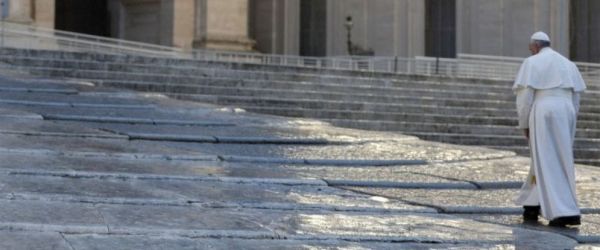In today’s Gospel passage (cf. Lk 12:32-48), Jesus calls his disciples to be continually vigilant. Why? In order to understand God’s transition in one’s life because God continually passes through life. And he indicates the manners in which to live this vigilance properly: “Let your loins be girded and your lamps burning” (v. 35) This is the way. First and foremost, “the loins girded”, an image that evokes the attitude of the pilgrim, ready to set out on a journey. It is a case of not putting down roots in comfortable and reassuring dwellings but rather to surrender oneself, to be open with simplicity and trust to God’s passage in our lives, to the will of God who guides us towards the next destination. The Lord always walks with us and often he takes us by the hand, to guide us so that we do not err on this journey that is so difficult. Indeed, those who trust in God know well that the life of faith is not something static, but rather dynamic! The life of faith is a continuous journey towards ever new phases that the Lord himself points out to us day by day. Because he is the Lord of surprises, the Lord of novelty, indeed of true newness.
And then — the first manner was “the loins girded” — next there is the request to keep the “lamps burning” in order to be able to light up the darkness of the night. Thus, we are invited to live an authentic and mature faith capable of illuminating the many “nights” of our lives. We know, we have all had some days which were real spiritual nights. The lamp of faith requires being continuously nourished by the heart-to-heart encounter with Jesus in prayer and in listening to his Word. I return to something I have said to you many times: always carry a small Gospel in your pocket, in your bag, to read. It is an encounter with Jesus, with Jesus’ Word. This lamp of encounter with Jesus in prayer and in his Word is entrusted to us for the good of all: thus nobody can pull back in an intimist way in the certainty of one’s salvation, not interested in others. It is a fantasy to believe that one can illuminate oneself within, on one’s own. No, it is a fantasy. Real faith opens the heart to our neighbour and urges us towards concrete communion with our brothers, especially with those in need.
And in order to help us understand this attitude, Jesus recounts the parable of the servants who await the return of their master from the marriage feast (v. 36-40), thus presenting another aspect of vigilance: being ready for the last and definitive encounter with the Lord. Each of us will encounter, will find him/herself in that day of encounter. Each of us has their own date for the definitive encounter. The Lord says: “Blessed are those servants whom the master finds awake when he comes; ... If he comes in the second watch, or in the third, and finds them so, blessed are those servants!” (v. 37-38). With these words the Lord reminds us that life is a journey towards eternity; therefore, we are called to employ all the talents that we have, without ever forgetting that “here we have no lasting city, but we seek the city which is to come” (Heb 13:14). In this perspective, every instant becomes precious, and thus we must live and act on this earth, while longing for Heaven: our feet on the ground, walking on the ground, working on the ground, doing good on the ground and the heart longing for Heaven.
We cannot truly understand in what this supreme joy consists. However, Jesus lets us sense it with the analogy of the master who, finding his servants still awake on his return: “will gird himself and have them sit at table, and he will come and serve them” (v. 37). The eternal joy in heaven is manifested this way: the situation will be reversed and it will no longer be the servants, that is, we who will serve God, but God himself will place himself at our service. And Jesus does this as of now: Jesus prays for us, Jesus looks at us and prays to the Father for us. Jesus serves us now. He is our servant. And this will be the definitive joy. The thought of the final encounter with the Father, abundant in mercy, fills us with hope and stirs us to constant commitment, for our sanctification and for the building of a more just and fraternal world.
May the Virgin Mary support this commitment of ours through her maternal intercession.
[Pope Francis, Angelus, 11 August 2019]












